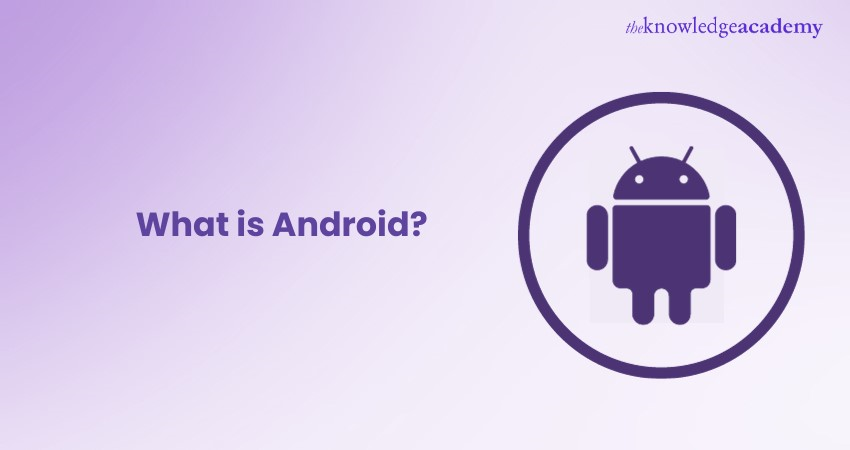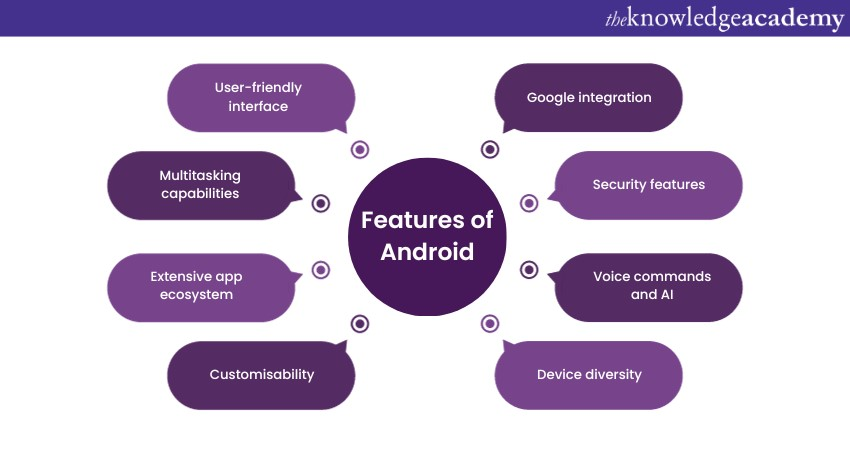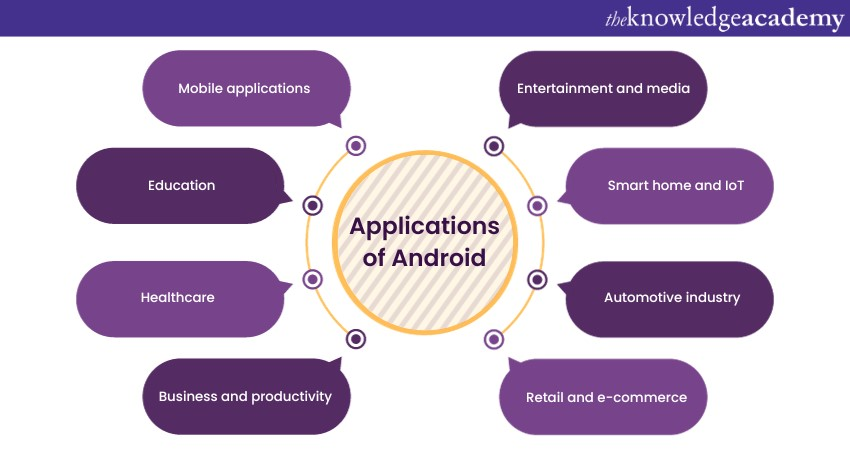We may not have the course you’re looking for. If you enquire or give us a call on +44 1344 203 999 and speak to our training experts, we may still be able to help with your training requirements.
Training Outcomes Within Your Budget!
We ensure quality, budget-alignment, and timely delivery by our expert instructors.

Smartphones have become extensions of our lives. Android acts as a driving force behind this technological revolution. It's not just an operating system. It's also an ecosystem that has redefined how we interact with our devices. But What is Android? In this blog, you will learn about What is Android, its evolution, its features, and some applications of Android.
Table of Contents
1) What is Android?
2) The evolution of Android
3) Features of Android
4) Applications of Android
5) The hardware platform used by Android
6) Different versions of the Android Operating System
7) Conclusion
What is Android?
Android, developed by Google, is a robust and versatile Operating System that powers several smart devices globally. The most important feature of Android is that it is an open-source platform, which allows developers to customise and enhance its qualities, fostering a vibrant ecosystem of applications and innovations.
It is built on a Linux Kernel, providing a stable foundation for numerous devices. Android OS is run on various devices ranging from smartphones and tablets to smart TVs and wearable gadgets. One of Android's defining characteristics is its user-friendly interface, enabling seamless navigation and accessibility for users of all levels of expertise.
Its integration with several Google services, such as Gmail, Google Maps, and Google Assistant, enhances productivity and enriches user experiences. Android's app ecosystem, housed in the Google Play Store, boasts millions of applications catering to diverse needs, from communication and entertainment to education and business.
Furthermore, it is not limited to traditional devices. It permeates various aspects of modern life, from smart home appliances to automotive systems. Android’s adaptability, coupled with continuous updates and improvements, makes it the most used Operating System worldwide.
The evolution of Android
The first version of the Android was launched in 2008. Since then, it has rapidly transformed, progressing through a series of versions. Each iteration refined its interface, enhancing performance and introducing groundbreaking features. Over the years, Android has seamlessly adapted to emerging technologies, incorporating advancements like Artificial Intelligence, Augmented Reality, and Biometric Security measures.
With each update, Android has not only improved user experience on smartphones and tablets but also expanded its reach, powering an extensive array of smart devices.
Want to learn more about Android App Development? Sign up for our Android App Development Training!
Features of Android
Android is a leading Operating System favourite among Developers for its versatility and dynamic nature. Here are some of its features:

1) User-friendly interface: Android's intuitive user interface is designed for accessibility and ease of use. Its customisable home screens, interactive widgets, and smooth navigation empower users to personalise their devices, creating a tailored experience suited to individual preferences.
2) Multitasking capabilities: It enables seamless multitasking, allowing users to switch between apps effortlessly. The split-screen view and picture-in-picture mode enhance productivity, allowing the users to run multiple applications simultaneously, making multitasking an easy task.
3) Extensive app ecosystem: The Google Play Store, Android's official app marketplace, hosts millions of applications catering to diverse needs. From productivity tools and educational apps to games and entertainment, Android offers many choices, ensuring there's something for everyone.
4) Customisability: Android's open-source nature grants users and developers unparalleled freedom. Users can personalise their devices with custom ROMs, themes, and widgets. Developers can modify the operating system to create unique user experiences, fostering a community-driven approach to innovation.
5) Google integration: It seamlessly integrates with Google's ecosystem of services, including Gmail, Google Maps, Google Drive, and Google Assistant. This integration enhances productivity, allowing users to synchronise data across devices and access a wide range of features seamlessly.
6) Security features: Android prioritises user security with features like robust app permissions, secure boot process, and encryption. Google Play Protect, the built-in security suite, scans apps for malware, ensuring a safe environment. Additionally, regular security updates bolster device safety, protecting users from evolving threats.
7) Voice commands and AI: Its integration with Google Assistant enables voice-controlled interactions, allowing users to perform tasks, answer queries, and control smart home devices through natural language commands. The integration of AI enhances predictive typing, intelligent replies, and contextual suggestions, streamlining user experience.
8) Device diversity: Android's adaptability extends beyond smartphones and tablets. It also powers smart TVs, wearables, automotive systems, and Internet of Things (IoT) devices, creating a unified ecosystem that caters to various technological needs.
Are you interested to build a career in App and Web Development? Sign up now for our App & Web Development Training!
Applications of Android
Android's impact extends far beyond the confines of smartphones and tablets, permeating diverse sectors and enriching various aspects of our lives. Its versatility, coupled with many applications, has catalysed innovations and connected communities globally. Let us see some applications of Android:

1) Mobile applications: The most apparent application of Android is in mobile devices. It powers many apps, from social media platforms and messaging services to gaming and productivity tools. These applications have redefined communication, entertainment, and work, enhancing efficiency and convenience for users worldwide.
2) Education: It has revolutionised education by offering interactive learning experiences. Educational apps facilitate online courses, virtual classrooms, and digital textbooks. These tools empower students with accessible, engaging, and personalised learning resources, making education more inclusive and effective.
3) Healthcare: Android applications are pivotal in the healthcare sector, facilitating remote consultations, health monitoring, and medication management. Health apps help users track their fitness, monitor vital signs, and access medical information, promoting a healthier lifestyle and empowering individuals to take charge of their well-being.
4) Business and productivity: Android applications enhance productivity in the corporate world. They facilitate tasks like document editing, project management, and virtual meetings. Business apps streamline operations, fostering collaboration and efficiency among teams, irrespective of geographical boundaries.
5) Entertainment and media: It powers streaming services, gaming platforms, and multimedia applications, delivering a rich entertainment experience. From music and movies to virtual reality games, Android applications provide a diverse range of entertainment options catering to various interests and preferences.
6) Smart home and IoT: Integrating IoT devices transforms homes into intelligent, interconnected spaces. Android applications enable users to control lighting, appliances, security systems, and more through smartphones, enhancing convenience and energy efficiency.
7) Automotive industry: Android Auto, a specialised version of Android for cars, offers navigation, music, and communication features, enhancing driver safety and in-car entertainment. Android's vehicle presence has redefined the driving experience, emphasising connectivity and infotainment.
8) Retail and e-commerce: Android applications have streamlined the retail sector, enabling mobile payments, inventory management, and personalised shopping experiences. E-commerce apps facilitate easy browsing, secure transactions, and doorstep deliveries, reshaping how we shop.
Improve your skills in Mobile App Development with our Mobile App Development Training. Sign up now!
The hardware platform used by Android
The hardware platform used by Android plays a crucial role in shaping the performance and capabilities of devices running this Operating System. It is designed to be versatile and compatible with a wide range of hardware configurations, from budget smartphones to high-end flagship devices. Some of these are:
a) Linux kernel foundation: Android's core operates on a Linux kernel, providing stability and a robust base for the operating system.
b) Versatile hardware compatibility: It supports various hardware architectures, including ARM, x86, and MIPS, allowing compatibility with processors from different manufacturers such as Qualcomm and MediaTek.
c)System-on-Chips (SoCs): Android devices use SoCs, integrating CPU, GPU, memory, and other components into a single chip, optimising both power consumption and performance.
d) Diverse sensors: Android devices incorporate a range of sensors like accelerometers, gyroscopes, GPS, and proximity sensors, enabling features like motion sensing, location services, and augmented reality applications.
e) Screen variety: It supports different screen sizes, resolutions, and display technologies, accommodating devices from smartphones and tablets to high-resolution TVs, ensuring a consistent user experience across devices.
Learn how to transform user experience with our User Experience (UX) Masterclass. Join now!
Different versions of the Android Operating System
The Android Operating System has undergone a series of transformative updates since its inception, each introducing innovative features and enhanced functionalities. From the inaugural Android 1.0, Astro, to the latest Android versions like Android 14, every iteration has brought improvements in user experience, performance, and security.
Notable versions include the widely adopted Android KitKat (4.4), known for its optimised performance on lower-end devices, and Android Marshmallow (6.0), which emphasises enhanced battery life and app permissions control. The constant evolution of Android reflects Google's commitment to ensuring users receive cutting-edge features and a seamless digital experience.
Conclusion
Android is not merely an Operating System. It's a global phenomenon that has redefined how we interact with technology. Its open nature, diverse ecosystem, and constant innovation have propelled it to the forefront of the digital revolution. As we move forward, understanding its intricacies is essential, empowering users and developers to harness its full potential.
Learn how to shape exceptional digital experiences with our UX / UI Design Jumpstart Training. Register now!
Frequently Asked Questions
Upcoming Programming & DevOps Resources Batches & Dates
Date
 Android App Development Course
Android App Development Course
Thu 5th Sep 2024
Thu 5th Dec 2024









 Top Rated Course
Top Rated Course



 If you wish to make any changes to your course, please
If you wish to make any changes to your course, please


